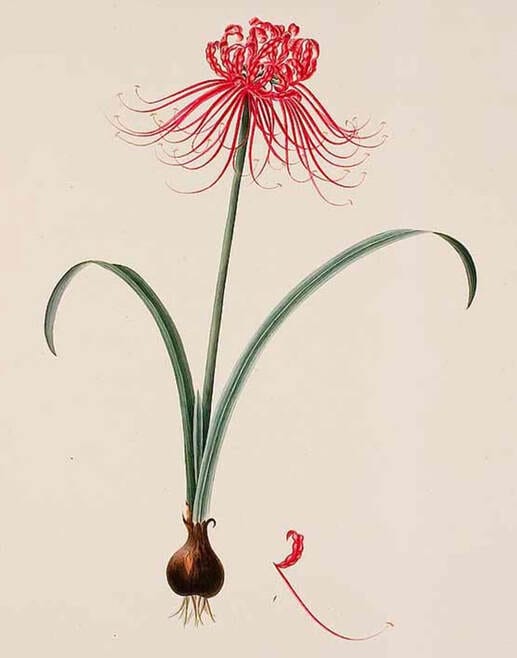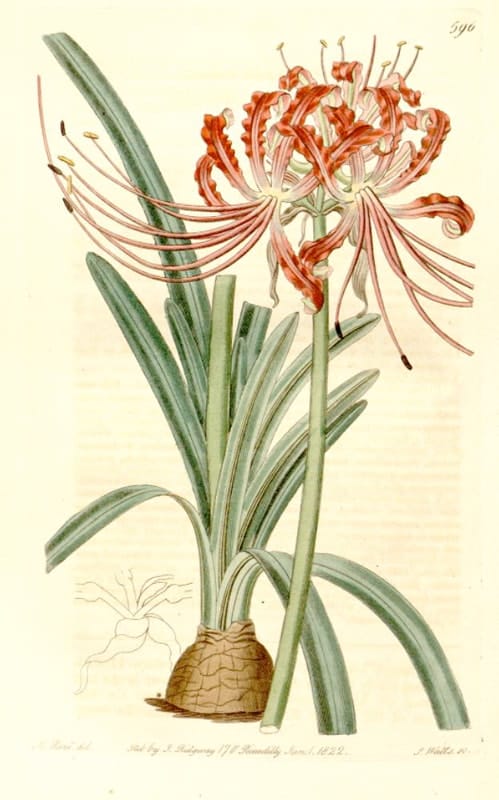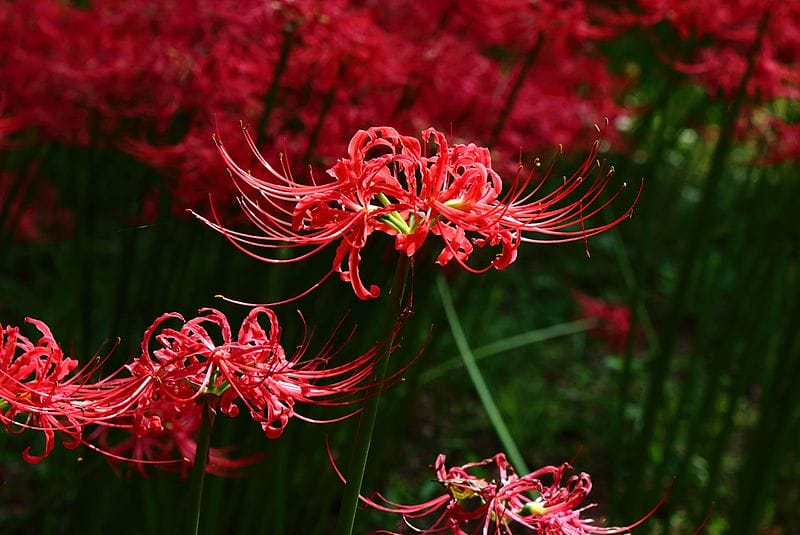Lycoris, Red Spider Lily, Shi Suan 石蒜
Shorttube LycorisShi Suan (“Stone Garlic”, TCM)
 Lycoris radiata
Lycoris radiata(Kerner, J.S., Hortus sempervirens, 1795-1830)
 Lycoris radiata
Lycoris radiata(Herbert, 1822) (Wikimedia)
 Lycoris radiata
Lycoris radiata(Photo by Kakidai) (Wikimedia)
Botanical name:
Lycoris spp.
- L. radiata (syn. Amaryllis radiata)
- L. chinensis
Parts used:
Bulb; occasionally the aerial parts
Temperature & Taste:
Warm, dry. Pungent, Sweet. Slightly Toxic
Classification:
Uses:
1. Clears Phlegm:
-Phlegm obstructing the Lungs, Cough, Asthma
-Pleurisy
-Scrofula, Nodes and Phlegm masses
2. Clears Wind-Damp, Opens Obstructions:
-Arthritis, Rheumatoid Arthritis
-Poliomyelitis (proven effect)
-also for Trauma and Bruising
-Hemorrhoids, Fistulas
3. Clears Damp, Promotes Urine:
-Edema, Dysuria
-Nephritis
-Jaundice
4. Resists Poison:
-pain and swelling of the Throat
-Toxic Sores and Swellings, Furuncles, Abscesses
-Food Poisoning
-Dysentery
-Snake Bite
-more recently for several Cancers
5. Emetic:
-full doses induce vomiting
5. Externally:
-paste can be applied to Toxic Sores and Swellings
-applied to rheumatic joint pain
-Ulcers and Fistulas
Dose:
Decoction: 1–3 grams
The fresh herb is crushed for topical application
Substitute:
Cremastra seu Pleione, Shan Ci Gu is similar in effect.
Preparation:
It can be stir-fried to lessen its toxicity
Main Combinations:
1. Food poisoning or excess Phlegm and saliva, take 1.5–3 grams of the fresh bulb and decoct to induce vomiting. (“Commonly used Chinese herbal medicines in Shanghai“)
2. Edema, acute Nephritis, make a paste of fresh Lycoris bulb and peeled Castor beans, and apply to the sole of the foot (Kidney 1 acupuncture point) for 24 hours. (“Zhejiang Folk Commonly Used Herbs“)
3. Jaundice, crush 1 fresh Lycoris bulb with 7 peeled Castor beans, apply the paste to the Heart. (“Commonly used Chinese herbal medicine in Nanjing area“)
4. Rheumatic joint pain, fresh Lycoris bulb, Ginger, Onion, smash to a paste and apply. (“National Collection of Chinese Herbal Medicine“)
Major Formulas:
Cautions:
1. Avoid overdose; toxic in overdose
2. Not used in Pregnancy
Toxicity:
Toxic doses of the alkaloid lycorine causes salivation, vomiting, diarrhea, stiff tongue, convulsions, cold hands and feet, weak pulse, shock, and potentially death due to paralysis of the respiratory center.
Main Preparations used:
- Extra Info
-
Research
–Alkaloids from bulbs of Lycoris radiata
–Chemistry and Biological Activity of Alkaloids from the Genus Lycoris (Amaryllidaceae)
ANTI-VIRAL
SARS / COVID
–Identification of natural compounds with antiviral activities against SARS-associated coronavirus
–Potential roles of medicinal plants for the treatment of viral diseases focusing on COVID‐19: A review
MALARIA
–Cytotoxic and Antimalarial Amaryllidaceae Alkaloids from the Bulbs of Lycoris radiata
ANTI-INFLAMMATORY
–Amaryllidaceae alkaloids from the bulbs of Lycoris radiata with cytotoxic and anti-inflammatory activities
–Alkaloids derived from traditional Chinese medicine are inhibitors for inflammation and acetylcholinesterase
NEUROPROTECTIVE
–Neuroprotective compounds from the bulbs of Lycoris radiata
ALZHEIMER’S DISEASE
–Acetylcholineestarase-Inhibiting Alkaloids from Lycoris radiata Delay Paralysis of Amyloid Beta-Expressing Transgenic C. elegans CL4176
–Alkaloids derived from traditional Chinese medicine are inhibitors for inflammation and acetylcholinesterase
CYTOTOXICITY
–Four new Amaryllidaceae alkaloids from Lycoris radiata and their cytotoxicity
–Cytotoxic and Antimalarial Amaryllidaceae Alkaloids from the Bulbs of Lycoris radiata
–Amaryllidaceae alkaloids from the bulbs of Lycoris radiata with cytotoxic and anti-inflammatory activities
ANTIPROLIFERATIVE
–Antiproliferative activities of Amaryllidaceae alkaloids from Lycoris radiata targeting DNA topoisomerase I
